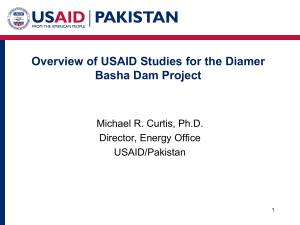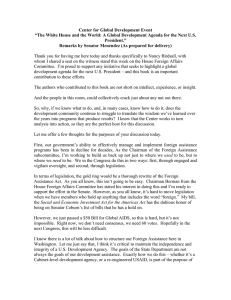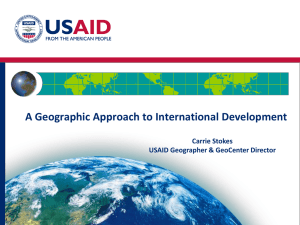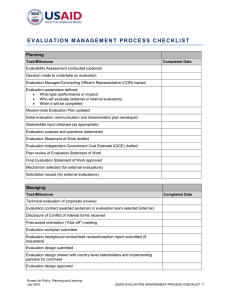S USAID Support to Iraqi Women Celebrating International Women’s Day, 2006
advertisement
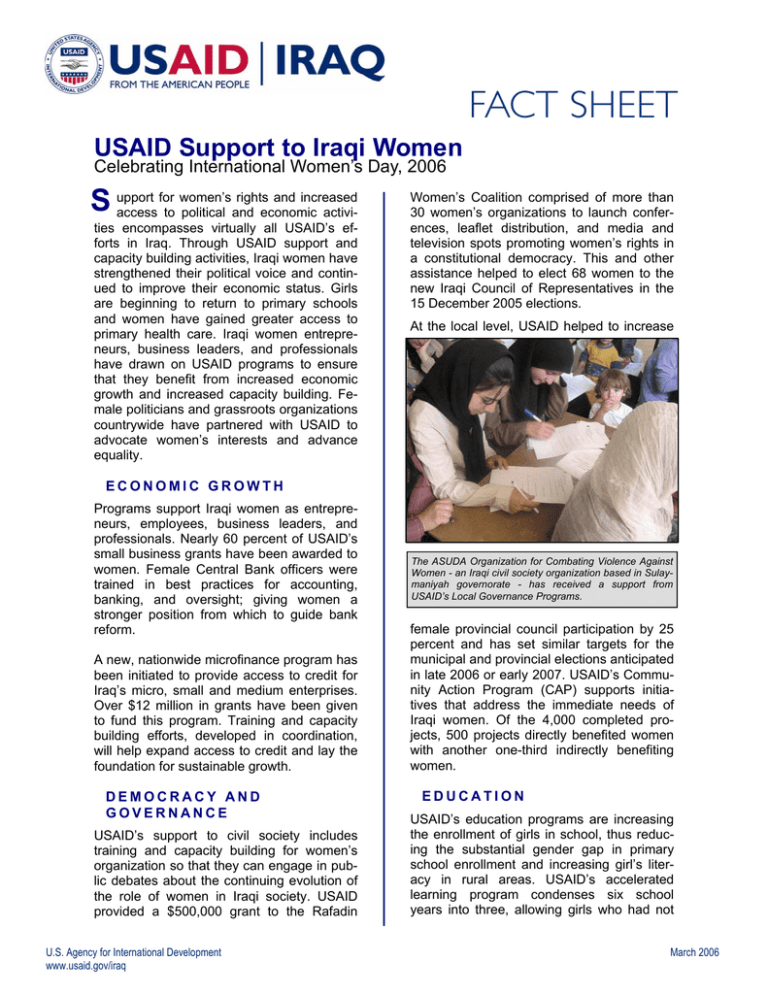
USAID Support to Iraqi Women Celebrating International Women’s Day, 2006 for women’s rights and increased S upport access to political and economic activities encompasses virtually all USAID’s efforts in Iraq. Through USAID support and capacity building activities, Iraqi women have strengthened their political voice and continued to improve their economic status. Girls are beginning to return to primary schools and women have gained greater access to primary health care. Iraqi women entrepreneurs, business leaders, and professionals have drawn on USAID programs to ensure that they benefit from increased economic growth and increased capacity building. Female politicians and grassroots organizations countrywide have partnered with USAID to advocate women’s interests and advance equality. Women’s Coalition comprised of more than 30 women’s organizations to launch conferences, leaflet distribution, and media and television spots promoting women’s rights in a constitutional democracy. This and other assistance helped to elect 68 women to the new Iraqi Council of Representatives in the 15 December 2005 elections. At the local level, USAID helped to increase ECONOMIC GROWTH Programs support Iraqi women as entrepreneurs, employees, business leaders, and professionals. Nearly 60 percent of USAID’s small business grants have been awarded to women. Female Central Bank officers were trained in best practices for accounting, banking, and oversight; giving women a stronger position from which to guide bank reform. A new, nationwide microfinance program has been initiated to provide access to credit for Iraq’s micro, small and medium enterprises. Over $12 million in grants have been given to fund this program. Training and capacity building efforts, developed in coordination, will help expand access to credit and lay the foundation for sustainable growth. DEMOCRACY AND GOVERNANCE USAID’s support to civil society includes training and capacity building for women’s organization so that they can engage in public debates about the continuing evolution of the role of women in Iraqi society. USAID provided a $500,000 grant to the Rafadin U.S. Agency for International Development www.usaid.gov/iraq The ASUDA Organization for Combating Violence Against Women - an Iraqi civil society organization based in Sulaymaniyah governorate - has received a support from USAID’s Local Governance Programs. female provincial council participation by 25 percent and has set similar targets for the municipal and provincial elections anticipated in late 2006 or early 2007. USAID’s Community Action Program (CAP) supports initiatives that address the immediate needs of Iraqi women. Of the 4,000 completed projects, 500 projects directly benefited women with another one-third indirectly benefiting women. EDUCATION USAID’s education programs are increasing the enrollment of girls in school, thus reducing the substantial gender gap in primary school enrollment and increasing girl’s literacy in rural areas. USAID’s accelerated learning program condenses six school years into three, allowing girls who had not March 2006 USAID/Iraq Celebrates International Women's Day Northern region: USAID’s Women’s Advocacy team is sponsoring and helping conduct a regional conference, helping local groups advocate for a national bill of women's rights. Southern region: Grants to local advocacy groups are supporting a festival on the premises of a doctor's social club. This festival will include children's songs, the showing of a documentary film about Iraqi women's history, a gallery of children's paintings that will be displayed under the banner No to Terror, distribution of equal rights outreach and educational materials, showing musical plays and a gallery of pictorial presentations on women's rights, a poetry recitation, and a game show testing participants on women's history. The Ministry of Human Rights and College of Law at a local major university are contributing books and other materials in support of the effort. Also, the Women’s Advocacy team is reaching out to the broader area, distributing flowers and presents to hospitalized women and visiting a women's prison to distribute gifts and other care baskets. Central region: A festival in Diyala, supported through a USAID rapid grant, will show four documentary films relating to an equal role of women in society, and a gallery of paintings. South central region: USAID’s civil society program conducting a regional conference on women's advocacy and outreach efforts. Future efforts will continue to assist participating Iraqi women’s organizations. been enrolled catch up with their peers and receive a primary education. Girls learn life skills and gain the academic background necessary to return to formal schooling. Through building restorations, public outreach campaigns, and new, single-gender classrooms, USAID programs have worked to encourage girls from rural communities to return to school. Training programs will reach 75,000 female teachers and school administrators by the end of the current (2005-06) school year. USAID is also rehabilitating the water and sanitation facilities at 800 primary schools throughout Iraq. The dilapidated co-ed restrooms had significantly contributed to the decrease in female enrollment. HEALTH USAID is helping to strengthen essential primary health care services throughout Iraq, expanding access to maternal care nationwide. Since 2003, nearly 1 million pregnant women received vaccinations through USAID, UNICEF, and WHO efforts to restore crucial primary health care services countrywide. Working with local partners, USAID has trained 11,400 staff at over 2,000 community-based centers in almost every province to provide monthly rations of high protein biscuits and fortified milk to malnourished children and pregnant women. Other programs have provided supplemen- U.S. Agency for International Development www.usaid.gov/iraq March 2006 tary doses of vitamin A for more than 1.5 million nursing mothers and 600,000 children under two, and iron folate supplements for over 1.6 million women of childbearing age – helping to combat anemia, a major problem in Iraq and the greater Middle East. AGRICULTURE In the agricultural sector, USAID is training women and men in improved crop and livestock production technologies, market development, financial management, business planning and rural credit, and improved resource management. Coordinating with the Ministry of Agriculture in Baghdad and local ministries in Sulaymaniyah and Erbil, USAID partners are conducting agricultural production surveys for crops, livestock, and poultry. Training on essential survey, statistics, and data processing skills for ministry staff – nearly 20 percent of who are women – has greatly assisted national agricultural planning. A countrywide program for agro-ecological zone mapping, essential for land planning, has depended heavily on women staff from After suffering decades of oppression, Halabja is now listening to the first sounds of freedom. A grant from USAID’s Community Action Program (CAP) purchased equipment and furniture to support the launch of the first independent radio station in Iraq—a station operated by women and devoted to women’s programming. the ministries of Agriculture, Transportation, Planning, and Water Resources. Beekeeping and livestock programs have provided disadvantaged, rural women with the skills and equipment needed to participate in these low-cost high-value traditional industries. WANT TO KNOW MORE? International Women’s Day is celebrated in many countries around the world. It is a day when women are recognized for their achievements without regard to divisions—whether national, ethnic, linguistic, cultural, or political. It is an occasion for looking back on past struggles and accomplishments and, more importantly, for looking ahead to the untapped potential and opportunities that await future generations of women. The contributions that women make to the economic, social, and political lives of their nations, communities, and families make them key actors in effective development. Worldwide, more than 800 million women are economically active in agriculture, small and micro-enterprises, and, increasingly, in the export processing industries that drive globalization and regional economic growth. Iraq Success Stories: Meet the Beneficiaries http://www.usaid.gov/iraq/accomplishments/success_stories_0206.html Women in Development: Achieving Results http://www.usaid.gov/our_work/cross-cutting_programs/wid/ UN: International Women's Day 2006 http://www.un.org/events/women/iwd/2006/ USAID: Our Commitment to Iraq http://www.usaid.gov/iraq/accomplishments/ U.S. Agency for International Development www.usaid.gov/iraq March 2006


